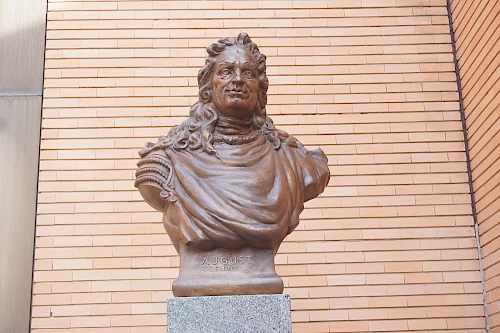Weekly review no. 4
20.10.2023
Stationary border controls
Since Monday evening, Germany has resumed stationary controls at the border with the Czech Republic for the first time since the corona pandemic. Fixed controls were set up at the A17, Heideholz rest area. From the direction of the Czech Republic, traffic behind the state border was narrowed to one lane and routed through the Heideholz rest area. There are further fixed checkpoints at the Reitzenhain/Hora Svatého Šebestiána border crossing (B172/I7). There were also temporary checks at smaller border crossings.
Depending on the time of day and the intensity of the inspection, there were sometimes significant delays in travel time. Czech employees who commute to work in Saxony reported waiting times of up to half an hour. When a Euroregion employee re-entered Saxony from the Czech Republic on the Dresden-Prague motorway on Wednesday afternoon, a kilometer-long queue of trucks had formed in the right-hand lane, stretching far into the Czech Republic. However, cars were able to drive past the truck queue and queue up just before the narrowing. The federal police only carry out random checks and allow most vehicles to roll through slowly. This way the time delay was only up to two minutes. At regular intervals, suspicious vehicles (delivery trucks, but also semi-trailers) were brought into the parking lot and searched.
Czech commuters expressed themselves predominantly negatively in Facebook groups (Pendleři). The controls would make the daily commute to work much more difficult. Saxony relies on Czech skilled workers in many industries. Czech politicians such as Interior Minister Vít Rakušan expressed understanding and the belief that Germany only carries out random checks and thus affects entry as little as possible. They also expect that the inpatient controls will only be used temporarily.
After much hesitation, Germany requested inpatient controls from the European Union. The background is the growing number of migrants who enter Germany illegally across the Czech-German border with the help of smugglers. The state of Saxony had previously supported the federal police's veil search with its police.
Bust for August the Strong

A bust of August the Strong was unveiled in Teplice. At the back of the Beethoven spa house, the bust sits on a pedestal in Lázeňská (Badgasse). The spa company commissioned the bust from the sculptor Libor Pisklák and wanted to use it to honor the spa town's close ties to the Saxon court. Every year August and his court moved into Teplice. His entourage numbered up to 1,500 people and 1,000 horses. In 1705, for example, he was accompanied by the court guard. 220 men of infantry and 209 of cavalry. This year marked the 340th anniversary of August's first spa stay in Teplice. The elector and later Polish king wasn't just here to take a cure. Teplice was also governed properly. The place was ideal for foreign policy because August was not the only ruler here. Teplice has always been the spa town of rulers. Augustus was also not the first Saxon ruler, he just continued a tradition that continued until his great-great-grandson, King Friedrich Augst II.
Teplice modernizes cultural center
The North Bohemian Philharmonic Orchestra from Teplice has to move to the neighboring Erzgebirge Theater because its venue, the Culture House, is being renovated. The work of star architect Karel Hubáček, who became known for his radio tower and mountain hotel on Ještěd, will receive a new foyer and a new main entrance. This means that the cultural center can now be accessed from two sides. The foyer area is complemented by a new café with outdoor seating. New escape routes had already been created beforehand. The house also gets new and more toilets, new electrics, new air conditioning and new heating.
However, the rest of the building remains unaffected by the renovation. The heart of the cultural center, which borders directly on the well-known colonnade made of steel and glass, is the concert hall with 550 seats. It is the most modern in the Czech Republic outside of Prague and is known for its great acoustics.
New podcast: Czech Republic six times
The Czech Republic is the focus of the Saxon State Center for Civic Education (SLpB). With the new podcast “Six Times Czech Republic” the institution is getting closer to the neighboring country. The first episode deals with the topic "Climate and Environment", with guests such as former Environment Minister Bedřich Moldan, analyst Romana Březovská, environmental psychologist Jan Krajhanzl and MEP and former Defense Minister Alexandr Vondra. The second episode has already been published. It is dedicated to the topic of "Czech Republic's relationship with Russia". Guests include the historian Karel Svoboda, the political geographer Michael Romancov and the extremism expert Jan Charvát.
As the name suggests, a total of six episodes are planned on six different topics. The podcasts are created in collaboration with Radio Prague International and will be published gradually. Episode three on the topic of “LGBTQIA+ and the Catholic Church” will be published in November.
